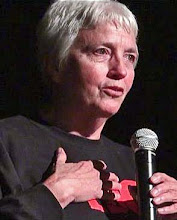Ever since I became aware of homelessness, from the early 1980s,
I figured it was, at least in some part, about money.
I knew people didn’t care much for the homeless men and
women being seen more and more on streets of cities across the country. Media
depictions of these frightening bedraggled “street people” began the
perhaps inadvertent campaign to demonize people without homes. It worked. If
you ask people to describe homeless persons, you’ll see what I mean.
My memory goes back to Mitch Snyder, a DC
activist who took up the issue, going head-to-head with federal officials and
eventually backing President Reagan into a corner as Snyder fasted almost to death
on the street across from the White House to get the government to do something. They did, passing the McKinney Act in 1987. I met Mitch. His
determination and conviction impressed me. I became involved with advocacy
along with running shelters, an essential combination, I believe.
Back then, homeless adults were the visible and predominant
manifestation of homelessness. At the human service agency where I worked,
we began to see a few families, but they were rare. As time passed, into the 90s,
families trickled into our emergency overnight shelter. Looking back, we didn’t
do enough for the families, but we tried our best to make sure they had shelter,
pathetic as our efforts were.
After the drastic changes to our dysfunctional welfare
system, some of us feared the worst for the families too shattered to move into
self-sufficiency. But the economy was somewhat functional, and things didn’t
appear as dreadful as some of us thought, although signs were brewing like
storm clouds.
Throughout the 1990s, we began to notice different—invisible—forms
of homelessness. Sure, we were seeing more families in our shelters, but when
we (IL Coalition to End Homelessness) examined the issue of homeless families
staying in motels in the Chicagoland area, we were shocked. Across the 8 collar
counties, families were scattered in no-tell-motels and some of the
less-expensive chains. We released a
report on what we found. It was a storm warning. No one heeded it.
Instead, Congress went about quietly tinkering with programs
serving homeless persons. They made it harder to qualify for subsidized
housing, and reduced HUD’s
budget dramatically and tragically. They funded software to track and count
homeless people (only those deemed “chronic”) and reshaped how communities
organized to address homelessness into mostly dysfunctional “Continuum of Care”
alliances.
Anti-welfare sentiments contaminated programs designed to
serve people in poverty. Bad credit became a good reason to deny people housing
or a job. Prisons, overflowing, turned people out to a world where the label “ex
con” meant less than human.
One bright spot…. After considerable advocacy, the McKinney-Vento
Homeless Education Act passed in 2001, implemented in 2002, guiding schools
education for homeless children and youth. It’s been an uphill climb, but
progress is being made, despite some recalcitrant educators.
Then the seismic changes of the 21st century hit.
And when the economy nose-dived in 2008, the first group to explode on the
poverty and homelessness scene was families and young people (without parent/guardians). No surprise.
And along the way, the National Alliance to End Homelessness
(NAEH) received sizable funding to provide technical assistance for HUD. Benign
as that sounds, it ties NAEH to HUD. So this “advocacy” group becomes, in my
opinion, a lapdog to the agency that needs a dog nipping at their heels, not
drooling in their lap. In the process, NAEH has become a vehement opponent of
expanding the homelessness definition to include families and kids.
One obvious result of this “partnership,” HUD’s homelessness
numbers are astoundingly low, NAEH proudly
reported in June. Gee. Not bad for a country in the economic sewer. Not
real, but let’s not confuse reality and glee.
The US Department of Education reports almost 1 million identified (likely that many more unidentified) homeless
students. It doesn't include younger ones--our Littlest Nomads. Here are
the stats. Read ‘em and weep for the million kids who have no
home. If watching TV is something you’d rather do than read dry, depressing government
reports, this
link connects you with the recent CBS 60 Minutes account about families living
in their cars. Not to be denied—the reality that millions of kids, some in
families and some on their own, are homeless in America. If you're so inclined, take in 4 minutes of kids talking on our HEAR US documentary, My Own Four Walls.
Seems to me it’s time for NAEH to resign as voice of
homeless persons. Conflict of interest has gotten in their way. The kids at
Thursday’s hearing will make that perfectly clear. It remains to be seen who
will listen and care.
























